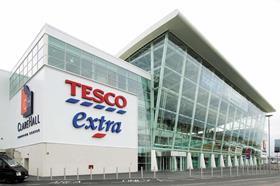
Tesco has announced it will remove 'one billion pieces of plastic' from its own-brand products in UK stores by the end of 2020 as part of its plan to tackle plastic use.
The arguably hard-to-quantify pledge is part of the retailer’s 4Rs strategy – to Remove, Reduce, Reuse, Recycle – and will see it remove non-recyclable and excess packaging from a wide range of products.
Tesco said that where plastic can’t be removed, for example where it prevents food waste, it will work with its suppliers to reduce plastic to an absolute minimum.
In addition, opportunities will be explored to reuse packaging and ensure that anything left is recycled as part of a closed loop.
“If packaging can’t be recycled, it will have no place at Tesco,” the retailer added in a statement.
The drive to remove one billion pieces of plastic will see Tesco remove:
- Small plastic bags, commonly used to pack loose fruit, vegetables and bakery items, and replacing them with paper ones
- Plastic trays from ready meals
- Secondary lids on products such as cream, yoghurts and cereals
- Sporks and straws from snack pots and drinks cartons
- 200 million pieces of plastic used to pack clothing and greetings cards
In August, Tesco met with 1,500 suppliers to tell them packaging will form a key part of its decision-making process which determines which products are sold in its stores.
The retailer has made clear to its suppliers that it reserves the right to no longer stock products that use excessive or hard-to-recycle materials.
It has already stopped offering carrier bags with online deliveries – a decision which will stop 250 million bags being produced every year.
Tesco CEO Dave Lewis said: “By focusing on solutions that we can apply across all our UK stores and supply chain, we can make a significant difference and achieve real scale in our efforts to tackle plastic.”
WWF UK’s sustainable materials specialist, Paula Chin, commented: “Plastic pollution is the most visible symptom of the environmental crisis we’re currently facing.
“Businesses, governments and households have all got an important part to play, so it’s good to see Tesco’s commitment to significantly reduce the amount of plastic we use.”
Since announcing its ambition in 2018 to remove hard-to-recycle materials, Tesco said it had eliminated the hardest-to-recycle materials from own brand products by the end of 2019, removing over 4,000 tonnes of materials from 800 lines.
The retailer said it was also working with branded suppliers on this.



